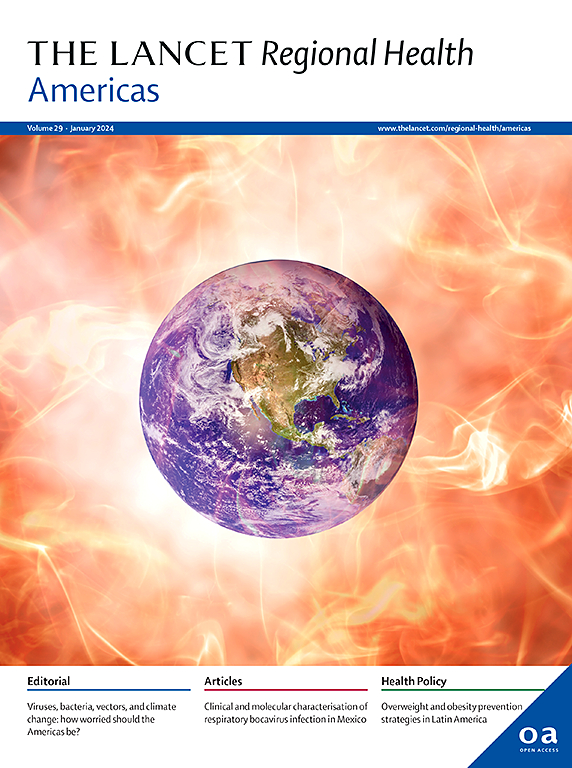在以人群为基础的西班牙裔队列中,使用单祖先和多祖先模型评估阿尔茨海默病的多基因风险评分预测性能
IF 7
Q1 HEALTH CARE SCIENCES & SERVICES
引用次数: 0
摘要
多基因风险评分(PRS)在预测欧洲人阿尔茨海默病(AD)风险方面是有效的,但对西班牙裔的研究还不够。基于多祖先的全基因组关联研究(GWAS)可以提高PRS的预测。我们使用了来自最大的非洲、欧洲和西班牙裔人群的GWAS数据,并使用新颖的方法进行了PRS分析,以评估单一和多祖先PRS模型在预测西班牙裔人群AD风险方面的表现。方法载脂蛋白e (APOE)、单祖先PRS和多祖先PRS预测临床AD、事件AD和认知的能力,并对来自两项大型研究的2961名西班牙裔患者进行评估。以GWAS为中心的方法基于多祖先GWAS构建PRS,而以方法为中心的方法使用新颖的多祖先PRS方法,集成跨祖先的GWAS汇总统计。采用10次5倍交叉验证。在一个子集中,血浆生物标志物数据被用于调优验证分割,以检查PRS在预测单一和组合生物标志物方面的性能。使用以方法为中心的方法构建的不含APOE的多祖先PRS优于以gwas为中心的方法构建的单祖先和多祖先PRS。以方法为中心的最佳PRS,结合了非洲人、欧洲人和西班牙人GWASs的汇总统计数据,分别解释了1.6%、3.9%和1.7%的临床AD、事件AD和认知差异,与APOE解释的差异相当,甚至更高。在生物标志物分析中也观察到类似的结果。APOE解释了血浆P-tau水平的更多变化,而PRS解释了血浆a - β水平的更多变化。将新的多祖先PRS方法(如PROSPER/PRS- csx)与跨祖先的GWAS相结合,提高了西班牙裔人群AD风险预测的准确性。APOE和PRS可能指向AD的不同生物学方面。资助国家卫生研究院R01 AG072474, RF1 AG066107, 5R37AG015473, RF1AG015473, R56AG051876, R01 AG067501, UL1TR001873。本文章由计算机程序翻译,如有差异,请以英文原文为准。
Evaluating polygenic risk score prediction performance for Alzheimer's disease in a population-based Hispanic cohort using single- and multi-ancestry models
Background
The Polygenic risk score (PRS) is effective in predicting Alzheimer's Disease (AD) risk among Europeans but remains understudied in Hispanics. Genome-wide association studies (GWAS) based on multiple ancestries can improve PRS prediction. We used GWAS data from the largest available African, European, and Hispanic populations and performed PRS analyses using novel methodologies to evaluate the performance of single- and multi-ancestry PRS models in predicting AD risk among Hispanic population.
Methods
Prediction performance of Apolipoprotein-E (APOE), single-ancestry PRS, and multi-ancestry PRS derived from GWAS-focused and method-focused approaches to clinical AD, incident AD, and cognition and were evaluated in 2961 Hispanic people from two large studies. The GWAS-focused approach constructs PRS based on multi-ancestry GWAS, while the method-focused approach uses novel multi-ancestry PRS methods, integrating GWAS summary statistics across ancestries. Ten repetitions of 5-fold cross-validation were used. In a subset, plasma biomarker data were used in a tuning-validation split to examine PRS performance in predicting single and combined biomarkers.
Findings
The multi-ancestry PRS excluding APOE, constructed using the method-focused approach, outperformed both single-ancestry and multi-ancestry PRSs from the GWAS-focused approach. The best method-focused PRS, incorporating summary statistics from GWASs of African, European, and Hispanic populations, explained up to 1.6%, 3.9%, and 1.7% of the variance in clinical AD, incident AD, and cognition, respectively–comparable to, or even higher than, the variance explained by the APOE. Similar findings were observed in biomarker analyses. APOE accounted for more variation in plasma P-tau levels and PRS explained more variation in Aβ levels.
Interpretation
Integrating novel multi-ancestry PRS methods (e.g., PROSPER/PRS-CSx) with GWAS across ancestries enhances prediction accuracy for AD risk among Hispanic population. APOE and PRS may point to different biological aspects of AD.
Funding
National Institutes of Health R01 AG072474, RF1 AG066107, 5R37AG015473, RF1AG015473, R56AG051876, R01 AG067501, and UL1TR001873.
求助全文
通过发布文献求助,成功后即可免费获取论文全文。
去求助
来源期刊

Lancet Regional Health-Americas
Multiple-
CiteScore
8.00
自引率
0.00%
发文量
0
期刊介绍:
The Lancet Regional Health – Americas, an open-access journal, contributes to The Lancet's global initiative by focusing on health-care quality and access in the Americas. It aims to advance clinical practice and health policy in the region, promoting better health outcomes. The journal publishes high-quality original research advocating change or shedding light on clinical practice and health policy. It welcomes submissions on various regional health topics, including infectious diseases, non-communicable diseases, child and adolescent health, maternal and reproductive health, emergency care, health policy, and health equity.
 求助内容:
求助内容: 应助结果提醒方式:
应助结果提醒方式:


